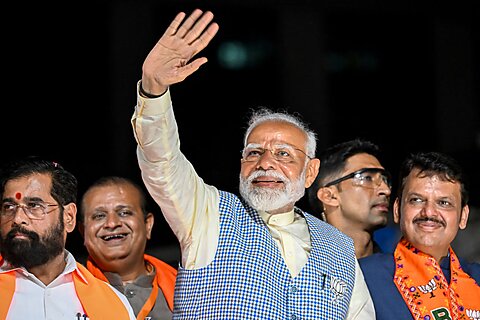Swaminathan S. Anklesaria Aiyar
Viva Indian democracy! Opinion polls and exit polls had suggested a third successive runaway victory for Narendra Modi’s Hindu nationalist party, the Bharatiya Janata Party (BJP). It seemed that Modi was all set, with massive public approval, to take India towards a Hindu autocracy. In fact, he just scraped through on the crutches of two regional party allies. The BJP itself fell far short of a majority on its own and will have to negotiate every future step with allies it had gotten used to ordering around.
Voters have sent an unmistakable message that India is not going to become a Hindu autocracy. The BJP’s anti‐Muslim hate speech during the election campaign has not won votes. Dissent and media criticism, which Modi muzzled in the last five years, will come back, though many media houses will still play it safe.
He has misused draconian laws on money laundering and unlawful activities that deny bail to arrest foes on dubious charges. Two opposition chief ministers are in jail. Opposition politicians are often targeted under these two laws, and cases against them are dropped if they defect. Modi can continue using these draconian laws to reward friends and punish foes, in the media as well as politics. But he stands warned that such tactics may not endear him to voters.
Modi boasted 74 percent popular approval, higher than that of any other democratic leader. Both the opinion polls and exit polls suggested a BJP sweep. Why were they so badly off the mark? The answer is that when dissent is curbed and too many media outlets become fawning courtiers, the ruling party is denied information about what is going wrong and where dissatisfaction is spreading. Fear of retribution prompts bogus praise and oaths of support for the leader, while dissenters prefer to keep silent. The truth only comes out in a secret ballot.
However, the bottom line is that Modi is back in power. Practitioners of realpolitik say that what matters is who won, not the margin of victory. But Modi’s capacity to shape India’s future stands transformed. He is no longer the Hindu knight in shining armor who conquers all. His moral authority to mold India to his liking, once seemingly unchallenged, has crumbled. He has nowhere near enough seats in Parliament to amend the Constitution at will, an outcome that was widely feared earlier.
Modi said recently that he felt a divine force helping him shape India’s future. Religious delusions are recognizable signs of megalomania. Yet many were circumspect in their criticism because, to date, Modi did indeed have the appearance of a Hindu knight in shining armor, beloved by the people, taking the country in a new direction. The sheen is now gone.
On which issues were voters most unhappy with the BJP? No simple answer will suffice. Unemployment and inflation have always been at the top of public gripes. Communalism and misuse of laws may have put off some voters. But none of this explains why the BJP made a clean sweep in some states but stumbled badly in some traditional strongholds. Very possibly deeper analysis will reveal local issues that took precedence over national ones. The BJP campaigned as though the only issue was Modi. That was an error.

